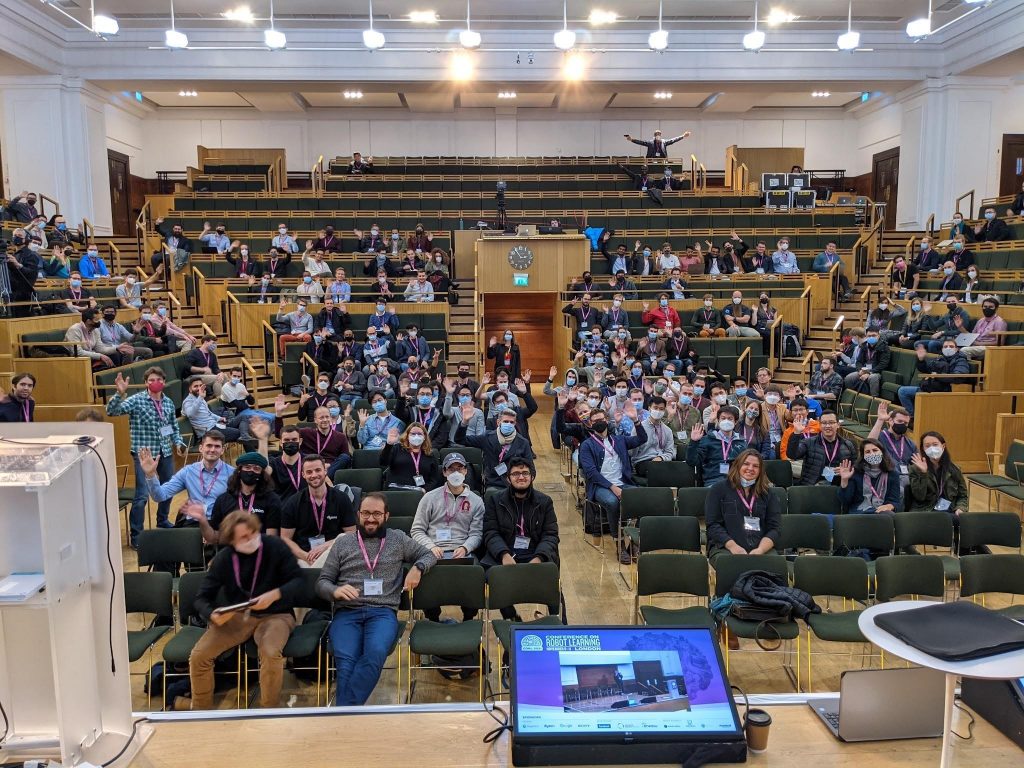Robotics and artificial intelligence to improve health rehabilitation
Robotics and artificial intelligence to improve health rehabilitation
How Simbe Robotics is Innovating in Retail
Kate speaks with Brad Bogolea, CEO and Co-founder of Simbe Robotics. Simbe Robotics developed a mobile robot named Tally, which is bringing advanced shelf insights to improve the retail shopping experience.
Tally provides a state-of-the-art sensing system on a robust, scalable platform that collects analytics in real-time.
Brad Bogolea

Brad Bogolea is the CEO and Co-Founder of Simbe Robotics, where he is responsible for the company’s vision and execution of its leading retail intelligence solution. In November 2015, Brad brought to market the Tally robot, the world’s first autonomous shelf auditing and analytics solution to help retailers ensure merchandise is always stocked, in the right place, and correctly priced. The National Retail Federation Foundation has named Brad to its list of “People Shaping Retail’s Future.
Prior to Simbe, Brad spent 10 years in the energy and wireless sensor industry. Most recently Brad worked at Silver Spring Networks, where he led global product management and business development efforts for their energy management and data analytics platform for energy utilities. Products under Brad’s leadership allowed the world’s largest utility companies and their energy consumers alike to gain efficiency and visibility of their energy usage through smart sensors and data.
Brad holds a B.S. in Computer Science and Engineering from Pennsylvania State University where he also returned to serve as an Entrepreneur-in-Residence.
Links
- Simbe Robotics
- Download mp3 (34.8 MB)
- Subscribe to Robohub using iTunes, RSS, or Spotify
- Support us on Patreon
Pianists learn to play with robotic third thumb in just one hour
Offline Robot Programming for Polishing Aircraft Engine Lipskins
New concrete mold system uses the right amount of concrete and no more
Robot waiters take Iraq’s Mosulites back to the future
3 Applications of Green Robots for Sustainability in 2022
Top 10 recommendations for a video gamer who you’d like to read (or even just touch) a book
Sure the average video gamer is 34 years old, but the most active group is boys under 18, a group famously resistant to reading. Here is the RTSF Top 10 recommendations of books that have robots plus enough world building to rival Halo or Doom and lots of action or puzzles to solve. What’s even cooler is that you can cleverly use the “Topics” links to work in some STEM talking points by asking things like: do you think it would be easy reprogram cars to hit pedestrians instead of avoiding them? How would you fool a security drone? or Do you think robots should have the same rights as animals? But you may want to read them too, the first six on the list are books that I routinely recommend to general audiences and people tell me how much they loved them.
Head On – The rugby-like game in the book, Hilketa, played with real robots, is the best multiplayer game that never was. And paralyzed people have an advantage! (FYI: a PG-13 discussion of tele-sex through robots). Good for teachable moments about teleoperation.
Robopocalypse– Loved World War Z and read the book? They’ll love this more and it’s largely accurate about robots. Good for teachable moments about robot autonomy.
The Murderbot Diaries (series)- Delightfully snarky point of view of a security robot trying to save clueless scientists from Aliens-like corpos and creatures. Good for teachable moments about software engineering and whether intelligence systems would need a governor to keep them in line.
The Electric State– This is sort of a graphic novel the way Hannah Gadsby is sort of a comedian- it transcends the genre. Neither the full page illustrations nor the accompanying text tell the whole story of the angry teenage girl and her robot trying to outrun the end of the world. Like an escape room, you have to put the text and images together to figure out what is going on. Good for teachable moments about autonomy.
Tales from the Loop– the graphic novels, two in the series, are different from the emo Amazon streaming series. The books are much more suited to a teenage audience who love world building and surprising twists. Good for teachable moments about bounded rationality.
Kill Decision– Scarily realistic description of killer drones, with cool Spec Ops guy who has two ravens with call out to Norse mythology. Good for teachable moments about swarms (aka multi-robot systems).
Robots of Gotham– It’s sort of Game Lit without being based on a video game. Excellent discussion of how computer vision/machine learning works. Good for teachable moments about computer vision and machine learning.
The Andromeda Evolution– Helps if they’ve seen or read the original Andromeda Strain movie, but it can be read as a stand-alone. This commissioned sequel is a worthy addition. Good for teachable moments about drones and teleoperation.
Machinehood – A pro-Robots Rights group is terrorizing the world, nice discussion of ethics amid a lot of action- no boring lectures. Good for teachable moments about robot ethics.
The Themis Files– A earnest girl finds an alien Pacific Rim robot and learns to use it to fight evil giant piloted mecha invaders while shadowy quasi-governmental figures try to uncover its origins. Good for teachable moments about exoskeletons.
New microrobotic trajectory tracking method using broad learning system
A soft magnetic pixel robot that can be programmed to take different shapes
Top tweets from the Conference on Robot Learning #CoRL2021

The Conference on Robot Learning (CoRL) is an annual international conference specialised in the intersection of robotics and machine learning. The fifth edition took place last week in London and virtually around the globe. Apart from the novelty of being a hybrid conference, this year the focus was put on openness. OpenReview was used for the peer review process, meaning that the reviewers’ comments and replies from the authors are public, for anyone to see. The research community suggests that open review could encourage mutual trust, respect, and openness to criticism, enable constructive and efficient quality assurance, increase transparency and accountability, facilitate wider, and more inclusive discussion, give reviewers recognition and make reviews citable [1]. You can access all CoRL 2021 papers and their corresponding reviews here. In addition, you may want to listen to all presentations, available in the conference YouTube channel.
In this post we bring you a glimpse of the conference through the most popular tweets written last week. Cool robot demos, short and sweet explanation of papers and award finalists to look forward to next year’s edition in New Zealand. Enjoy!
Robots, robots, robots!
Here’s our fourth and final #CoRL2021 paper, on multi-stage imitation learning: https://t.co/22JqLMMp4X
We’re doing a live demo of this right now, see below! This sequence was trained with a single demonstration, and generalises across poses / distractors.
With @normandipalo. pic.twitter.com/ENEzKvAlRm
— Edward Johns (@Ed__Johns) November 11, 2021
ANYmal trotting around at #CoRL2021 pic.twitter.com/59ql6sEJEx
— Kai Arulkumaran (@kaixhin) November 9, 2021
When I am human – I like dogs a lot. But it turns out that when I am a robot – I am a bit timid around quadrupeds. Thanks to the wonderful team of #CoRL2021 who organized telepresence sessions (@Ed__Johns, @vitalisvos19, Binbin Xu, and others). This was a very curious experience! pic.twitter.com/mMEdqUq6yv
— Rika Antonova (@contactrika) November 11, 2021
We will be doing a live demo of iMAP at #corl2021, sessions 1 and 8 Monday and Thursday, come if you're around!https://t.co/Tagk4jocbe@liu_shikun, @joeaortiz, @AjdDavison pic.twitter.com/XTUYrkOWnO
— Edgar Sucar (@SucarEdgar) November 8, 2021
Papers and presentations
Excited to present our work at #CoRL2021 this week. Our paper shows a promising approach to achieve sim2real transfer for perception. w/ @ToyotaResearch @berkeley_ai (1/7) https://t.co/MAbYaXaPrY pic.twitter.com/scfv4DtOSJ
— Michael laskey (@Michaellaskey7) November 8, 2021
Ever wondered how to tune your hyperparameters while training RL agents? w/o running thousands of experiments in parallel? And even combine them?
Check out our work @ #CoRL2021 on training mixture agents which combines components with diverse architectures, distributions, etc pic.twitter.com/4tsqWXjf79
— Markus Wulfmeier (@markus_with_k) November 9, 2021
Proud to share "LILA: Language-Informed Latent Actions," our paper at #CoRL2021.
How can we build assistive controllers by fusing language & shared autonomy?
Jointly authored w/ @megha_byte, with my advisors @percyliang & @DorsaSadigh.
: (1 / 10) pic.twitter.com/K5vdUO8R6q
— Siddharth Karamcheti (@siddkaramcheti) November 8, 2021
In daily life after passing the paper exam for a permit, a newbie can drive the car for real under an expert's monitoring. This guardian mechanism is crucial for exploratory but safe learning. See our #CoRL2021 work https://t.co/OegFMwj9JS
Poster session today at Session 8 pic.twitter.com/IlKkZhk8UD— Bolei Zhou (@zhoubolei) November 11, 2021
I've just finished my talk in the Blue Sky oral session at #CoRL2021. Great to have a session which allows for unconventional opinions to be heard in this way. Looking forward to the next two!
Here's my paper, Back to Reality for Imitation Learning: https://t.co/TZLj77zGWV. pic.twitter.com/NnwZNaSsX5
— Edward Johns (@Ed__Johns) November 9, 2021
This week at #CoRL2021, our team explores how data efficient off-policy RL, on-board reward generation, and vision can teach walking and wall avoidance to small humanoid robots without laboratory instrumentation: https://t.co/ZZo9hJXXO5 1/2 pic.twitter.com/4qWqn1hefF
— DeepMind (@DeepMind) November 10, 2021
Awards
Congratulations again to the #CoRL #BestSystemPaper Winner, "FlingBot: The Unreasonable Effectiveness of Dynamic Manipulation for Cloth Unfolding", by Huy Ha and Shuran Song
Read it here: https://t.co/en8ic29gPM#robot #learning #robotics #award pic.twitter.com/P9ZW884dDn— Conference on Robot Learning (@corl_conf) November 12, 2021
Congratulations again to the #CoRL #BestPaper Winner, "A System for General In-Hand Object Re-Orientation", by Tao Chen, Jie Xu and Pulkit Agrawal
Read it here: https://t.co/QeIzAW1fng#robot #learning #robotics #award pic.twitter.com/niHDCArbmq— Conference on Robot Learning (@corl_conf) November 12, 2021
Congratulations to #CoRL2021 best paper finalist, "Robot Reinforcement Learning on the Constraint Manifold", Puze Liu, Davide Tateo, Haitham Bou Ammar, Jan Peters.https://t.co/SdssOu3akD#robotics #learning #award #research pic.twitter.com/Lpgn2XjEhY
— Conference on Robot Learning (@corl_conf) November 8, 2021
Congratulations to #CoRL2021 best paper finalist, "Learning Off-Policy with Online Planning", Harshit Sikchi, Wenxuan Zhou, David Held.https://t.co/7xUFyMlyQU#robotics #learning #award #research pic.twitter.com/D5u4NdDDST
— Conference on Robot Learning (@corl_conf) November 8, 2021
Congratulations to #CoRL2021 best paper finalist, "XIRL: Cross-embodiment Inverse Reinforcement Learning", Kevin Zakka, Andy Zeng, Pete Florence, Jonathan Tompson, Jeannette Bohg, Debidatta Dwibedi.https://t.co/Z4qVMiuhgS#robotics #learning #award #research pic.twitter.com/k2KSkv67vd
— Conference on Robot Learning (@corl_conf) November 8, 2021
Congratulations to #CoRL2021 best systems paper finalist, "SORNet: Spatial Object-Centric Representations for Sequential Manipulation", Wentao Yuan, Chris Paxton, Karthik Desingh, Dieter Fox.https://t.co/en8ic29gPM#robotics #learning #award #research pic.twitter.com/Hfn1CiZNP8
— Conference on Robot Learning (@corl_conf) November 8, 2021
Congratulations to #CoRL2021 best systems paper finalist, "Fast and Efficient Locomotion via Learned Gait Transitions", Yuxiang Yang, Tingnan Zhang, Erwin Coumans, Jie Tan, Byron Boots.https://t.co/HbrCOVZOpz#robotics #learning #award #research pic.twitter.com/T5Ev31PgPZ
— Conference on Robot Learning (@corl_conf) November 8, 2021
 :
: